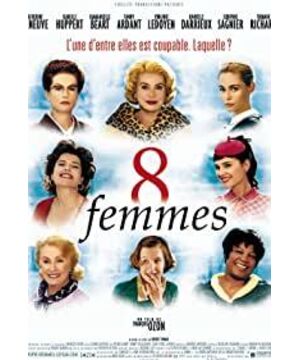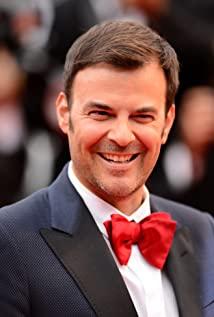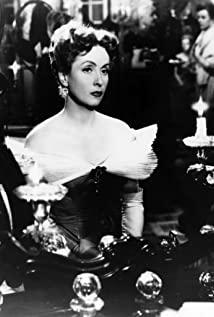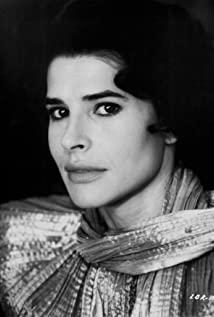In the 1950s, in a large house, people were preparing for Christmas, but on this festive day, they found that their parents had died unexpectedly, with a knife stuck in their backs. Each of the eight women beside him is hiding an unspeakable secret, and one of them must be the murderer. Who is it?
Grandmother: The mother-in-law of the deceased, a stingy woman who was addicted to alcohol, would rather keep her stock theft secret than give money to her son-in-law so that he could save a business that was going bankrupt. She also admitted to being the murderer of the colonel's husband.
Gabi: Wife of the deceased, who married the deceased shortly before giving birth to her first daughter, Su Brown, was the mistress of Jacques Farnou, a partner in her husband's business and the maker of its bankruptcy. Gabi had planned to escape to Mexico with Jacques Farno on the day Marcel went to sea. This woman only loves money.
Su Zong: The eldest daughter of the deceased. The fact that she knew she was not Marcel's biological daughter was in her own interest. She announced that she was pregnant, meaning that the child in her womb was the result of incest with Marcel. Su Zong appeared as a prosecutor throughout the day investigating the case before her secret was revealed.
Katerina: The youngest daughter of the deceased, spoiled by her father, arrogant and lazy, she considers her father to be the most ideal man. Her views on the status of women are very radical. Because she was fascinated by reading detective novels, she faked the so-called murder of her father, in order to expose the true face of every woman in the family, which also led to the tragedy that her father finally committed suicide.
Pierre Heiter: A woman who was oblivious to profit, a former naked dancer in a nightclub, Marcel's sister, who secretly infiltrated the deceased's house and tried to blackmail him. On the eve of the murder, she asked the deceased to give her half a million francs, and she gave Louise part of it to keep her mouth shut from her secret coming to the house. In fact, she was also the mistress of Jacques Farnou, with whom she often visited Madame Chanel for homosexuality.
Mrs. Chanel: housekeeper, cook, nanny to Su Brown and Caterina. She lived in the hunting loft of the mansion, to which Piet Haite secretly came, and Madame Chanel let her live there. Because of her homosexual relationship with Bierheit, she was very jealous of Bierheit's dealings with her brother.
Louise: Gabi's personal maid. She has only been working for her for two months, but she has been the mistress of the deceased for five years. The local dignitaries have been very close to her and Piet Haite. Louise is a peculiar woman who secretly falls in love with her mistress Gabi, and her loyalty to her is puzzling.
Augustina: Gabi's younger sister, the deceased's sister-in-law, a perverted old girl, with a mouth and a sword, indulging in romance novels all day, fantasizing about becoming her brother-in-law's mistress, and always brooding over her father's death, listen It is said that after his mother killed his father, he was bent on revenge for his father.
Marcel: This is a man worthy of sympathy and pity. He was bankrupted by his wife's lover and abandoned by his family. With the assistance of his youngest daughter, he performed a tragedy of pretending to be dead, so that the family could tell the truth and their respective Inner secrets, to achieve the purpose of revealing the truth to the world. But after listening to the inner confessions of eight women, Marcel was in extreme pain and committed suicide in front of his little daughter.
Eight Women is a rather unique film. On the surface, it looks like an Agatha Christina-esque detective suspense film, but in reality, the plot of the film is just a huge playground where the actresses can roam freely according to their assigned roles. Lançois Auzon can also perform on this venue according to the routines of detective novels. First of all, François Auzon has done perfection in the selection of actors. Who can be more suitable for the role of Gabi, a proletarian housewife than Caterina Deneuve? Which actress could fit the old girl Augustine better than Isabelle Huppert? Who could look more like Louise than Emmanuelle Béach in a maid's dress? Not only do all the actresses perform superbly, but each role is tailor-made for these celebrities. They are naturally willing to play these typed roles, revealing their inner life to the fullest, and enjoying it. The audience should not demand the logic of the storyline, just as looking at a work of art should not seek to understand the meaning of the work. The pros and cons of a work of art depends on whether it can impress you, whether it can make you have associations and passions. If you want to use this film to analyze the rationality of suspense films, it will be the opposite. The original purpose of the film was to bring these best-known actors together and rediscover their acting talents. Just like when we go to a Peking Opera performance, we watch the actors sing, read, and play, instead of studying the rationality of a drama plot. This film is a musical comedy that French audiences like to see and hear. Some people may think the songs in the film are ridiculous, and I also think some of the lyrics and performances are a bit silly, but they are really cute. It is very rare for three generations of famous actors to perform on the same stage. Their wonderful singing has already made people forget the plot of Agatha Christina's suspense film. If you have to determine which genre this film belongs to, I think it can be said to be a postmodern genreless film.
Every detective suspense film has such a scene: the characters in the play express their possible motives, and "Eight Women" is no exception. Each character has the experience of being unfaithful to the victim and has different reasons. Some people have sex with their lovers, some steal, some are Lesbians, some are stingy and desperate, homosexuality, adultery, incest, these are common phenomena in the world, all of which may be the motives of these eight women. However, the director The purpose is not to dig out their motives and find out the murderer, but in this situation, let them fully display their personal characteristics, and show the performance talents of each actor through songs and dances. The three-minute dialogue, consisting of a series of close-ups, fully revealed the character of each character. The hero dies mysteriously, the murderer is confusing, and everyone seems to be a murderer. Don't think that this film will unfold in a thrilling atmosphere like a detective film. On the contrary, the film is full of laughter and laughter, and the plot is carried out in the lyrical or exclamation singing of the eight heroines in turn. At the beginning of the film, some people may have doubts about the hero's stubbornness. In fact, he is not dead at all, but he and his little daughter have set up a puzzle. When the dirty secrets of these women were revealed little by little, he couldn't take it any longer, and finally shot himself! The result will surprise the audience. The director used the eight most beautiful women to perform a moving musical. The women attracted people's attention with their sexiest singing voices and dancing. The audience seems to be enjoying the eight women striptease in turn, taking off their beautiful costumes one by one, and when they are naked, they reveal wrinkled skin and deformed bodies.
From 1997, François Auzon filmed "Looking at the Sea", 1999's "Criminal Lover", until the launch of "Eight Women" in 2002, the director's goal is to surprise the audience, but The arrangement and development of the plot makes the audience feel that this kind of accident seems reasonable. The singing inserted in the film, although unexpected, helps the audience to understand the inner monologue of the characters. In the atmosphere of detective suspense, it is a clever trick. This film is a bit like "The Adventures of Dandan", the storyline is gripping, twists and turns, ups and downs, and it will never get to the bottom until the end. surfaced. Especially the old grandmother played by Daniel Daliyue. At the beginning of the film, she is in a wheelchair and looks very old, but suddenly she can walk with ease and ease, which is really unexpected. The main line of a suspense film is to find the murderer, but this film reflects the personality characteristics of eight women. Who is the murderer is not the first focus of the director. The director depicts eight women who are selfish and selfish through the characters' distinctive dialogues. Isabelle Huppert's character left an indelible impression. Fanny Ahdang's Piehét, though vulgar, is not distasteful, and shameless, but not as false as other women. Every character can laugh at themselves or others in the film. The maid Louise portrayed by Emmanuelle Béach is a typical French girl, while the eldest actor, Daniel Daliyue, has a relationship with Odley Hepburn looks like a god. The image created by Katerina Deneuve, especially in terms of temperament, is that of a bossy rich lady. The film is like a family portrait of French property owners after World War II. The film borrows a lot from classics: Fannie Ahdang's musical performance is a tribute to Rita Hayworth in "Gilda." The film "The Kite in the Garden" by Wansan Mineri and Douglas Serke seems to be reappearing in front of the audience. The film's strong colors and singing scenes are evident in the style of Jacques Demy and French cinema before the "New Wave".
Director Francois Ozon was born in Paris on December 15, 1967. In 1990, he was admitted to the directing department of the Paris Film School, and received a master's degree in 1993. In 1996, he won the "Golden Leopard of Tomorrow" at the Lugano International Film Festival for "A Summer Dress", and the two films that brought him international fame were "Eight Women" (2002) and "Swimming Pool" (2003). Ou Zong said "Swimming Pool" is a completely personal film that summarizes the hardships of the novel and screenwriting process. The director is characterized by his ironic focus on human sexuality and homosexuality. Many people know that François Ozon is a gay. Maybe it's because of being gay that a film that dissects women so thoroughly can be made. Some film critics believe that Ou Zong is a loyal believer of Chabrol and Hitchcock. He has a soft spot for thriller and suspense films, but also focuses on the middle class; some critics say that he likes to shoot indoor dramas and erotic themes. A follower of Fassbender. In short, he is considered to be the most promising director of the French Mesozoic. In fact, he is constantly experimenting with various styles and genres of films, and many people have discovered that he has the potential to be a master. What is commendable is that he keeps on exploring and trying hard to learn the advantages of masters from all over the world, instead of being constrained by the achievements of traditional French directors. For example, in this film, he refers to the Douglas Cerke and Alfred Hitchcock films in the 1950s, and hires the famous costumer Pascalina Chavanne, according to Dior's new concept, for each The actors made costumes, and composer Krishna Levy was invited to compose instrumental and vocal music for the film. Ou Zong has amazing creativity. Before the age of 22, he made more than 30 short films at low cost. Currently, the director is constantly experimenting with various styles. "5 × 2", which he shot in 2004, is one of his mature films. The so-called 5×2 is the five stages of love life: love, marriage, childbirth, breakup, divorce. Ou Zong uses flashbacks to replay the five stages step by step. The ending of the two protagonists breaking up is the beginning of their love. A pair of lovers walks towards the distant sea under the setting sun. They used to have love and then lost it, intoxicated and drugged by sex. When the male protagonist looked at his departed lover, he reluctantly asked, "Can we do it all over again?" The woman who was tormented by sex and love finally reluctantly chose to give up, and she gently closed the door , walked into the distance in the sound of cheerful music. Ou Zong used five styles to shoot these five stages. The first section draws on Fassbender's indoor drama technique, and the second section's wedding scene refers to Douglas Serke's Hollywood style, and the two are on the beach. The encounter scene is completely Eric Rommier's style. He can use Godard's symbolism skillfully, and he can also create a Hitchcock horror atmosphere like this film. For Ou Zong, he will not live under the shadow of the masters forever, a kind of postmodern film without genre and genre may be his true style.
The film has won many awards, and to a large extent, has a lot to do with the stars in the film: Caterina Deneuve is a representative of a generation of French beauties, and it has been suggested that her face should be replaced on the franc coin. Mariana. Her glamorous and gorgeous temperament can best represent the romance and pride of French women. She was in her late sixties when "Eight Women" was filmed, but it's amazing that her artistic youth has remained so flawlessly. From "The Umbrella of Cherbourg" to "The Last Subway", to "Indochina", to this "Eight Women", Katerina has been changing her way of acting, but the constant is her elegance Temperament and love of art. Isabelle Huppert is also a wonderful figure in the French film industry. Her performances of "La Traviata" and "Madame Bovary" are unforgettable. She feels cold, but her eyes are always passionate. She is not luxurious, but she is elegant. French actresses seem to be able to maintain their artistic youth forever, as evidenced by her performances in "Piano Teacher" in 2001 and "Eight Women" in 2002. Although Emmanuelle Béach is not a popular beauty, her acting skills are amazing. She has been a dancer for nearly a year, but she still maintains an enviable figure, which may be the reason why the director chose her to play a slutty maid in the film.
View more about 8 Women reviews











